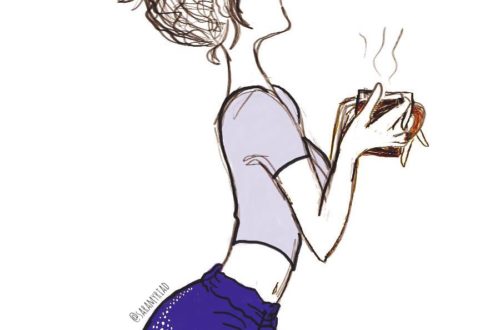This is part of my Half-Assed Minimalism series, in which I share tips that have helped me curb my shopping addiction. I believe in not being bossy or preachy, but rather giving people the tools to take small steps to improve their lives. I hope you will join me, and be inspired to find your own ways of embracing minimalism, whether that means being extreme or moderate. Good luck!
Trigger. It’s a word that has taken on very poignant meaning in recent times, whether it’s meant seriously: “Trigger warning: this book has drug use.”, or to mock others: “She was so offended at my joke. Talk about triggered!” Triggers, however, are a real thing, and when you are trying to overcome a shopping problem, it’s important to recognize them and learn ways to combat them.
The triggers in this post are 1. ones I have most struggled with, and 2. ones I feel a lot of others have encountered.
Newsletters
This is something nearly every website or brand has, but it’s also one of the worst offenders. Think about it: there’s a store you really enjoy, so you buy some items from it online. During checkout, it innocently asks if you want to subscribe to their newsletter, so you can be up to date on new items and sales. You think it’s a great idea and click the box. Suddenly, you’re getting 3-4 emails from them a day.
Solution: Unsubscribe! You will feel so much better without that clutter in your life. I know that a lot of companies make it harder than hell to truly unsubscribe; this is where that little “spam” button is your best friend.
Oh, and don’t sign up for anything that sends you daily deals. Just don’t.
Subscription Services
These are siblings to the newsletter, except unlike the newsletter, they are already getting your money, so are more dangerous. While I cannot speak for everyone, I, personally, have never signed up for a subscription box that was so amazing it justified the cost. (And I have tried many boxes with many themes —- makeup, nail polish, lifestyle, tea, coffee, books, etc.) This is because it’s really a gamble if you will truly love everything sent to you, every month. Also, just think of all the packaging that is used to ship these.
Solution: For the cost of several boxes, why not save up your money and buy one item you know you will really enjoy?
Not all sub services come in boxes, of course. We also have digital ones. These usually offer trial periods, where you can test them out before you buy. Of course, people often tend to forget the charge is coming until it’s too late. These type of subscriptions are a bit more open to leniency than boxes. If you work a job where you have earbuds in all day, an audio book subscription may be perfect for you. However, I would caution you to take a realistic look at your habits and activities and adjust accordingly. For me, while I do enjoy audio books, I am simply too busy most of the time to really get to listen to one, except when I’m commuting to work. It doesn’t make sense to pay monthly when it takes me a very long time to finish even one audio book.
Solution: The library is your best friend. Most libraries nowadays offer audio book lending services in addition to traditional books and magazines. Alternatively (or additionally), you can purchase an eReader, and save on space. You must still exercise caution and be a smart shopper, which I will bring up shortly.
Avoid sites that constantly have “shopping lists”, or “shopping haul” videos.
You know exactly the type of lists I mean. They’re usually packaged in fun words: “Shop This Post!” “Shop My Wardrobe!”, or the like. Usually, it consists of pretty product photos, with links to the websites. Haul videos glorify shopping addictions, and can be deceptive, since many larger channels get items sent to them in exchange for inserting the products into videos.
I am much more likely to buy something someone suggests if they have purchased it themselves, as opposed to getting the item for free and promoting it so they can use affiliate links. While not every content creator does this, and while I will never condemn anyone for wanting to earn money, the fact is, if you are trying to overcome a shopping problem, the last thing you need to see are sites or videos encouraging you to buy more. This often ties into my next point…..
Watch for phrases like: “Run out and buy this!” “You need this right now!” “Summer MUST-HAVES!”
The only things I have ever needed right now is probably the bathroom, food, or coffee. These phrases are deliberately used to manipulate people into feeling a sense of urgency.
Solution: Luckily, these are normally found hanging around other problem-causers on this list (especially the websites and newsletters), so if you avoid those, you will severely limit your exposure to these, too.
Limit your time on social media.
Advertisers pay good money to have their products inserted into your Facebook and Instagram feeds, and they are constantly working to make their product photos look more enticing.
Solution: Limiting your time puts these ads out of sight and out of mind.
Avoid falling into the mindset of “This is cheap. It only costs X, so it isn’t a big deal.”
This is one of my personal weaknesses, especially. I’ll see ebooks on sale for .99, $1.99, and so on, and decide it’s okay to get several since they’re so cheap. Next thing I know, I have spent $10 and I have a whole digital pile of new books, when I already had ones waiting to be read. These little costs can add up quickly, and digital clutter is still clutter.
Avoid discount stores / stores that offer “fast fashion”.
It can be fun to see all the deals in stores like Ross, TJ Maxx, or Marshall’s, but I would suggest not setting foot into these if you have a real shopping problem, at least until you are a little further along and can handle the temptation. This is especially true if you are a sale person—–someone who is more likely to go crazy with purchases because you feel you’re getting a great deal. Fast fashion stores usually specialize in trendy pieces that look great at first but quickly fade or pill, because they are made of cheap fabrics like polyester, rayon, or acrylic.
Solution: Discount stores can be great options in some cases, but try to not go in there unless you have a clear idea of what you are looking for. Ex: “I am looking for a pair of brown boots.” You can even go a step further and decide on a limit you want to spend, and only bring that amount in cash (leave the credit cards at home if you can).
Fast fashion can be hard to combat because it is everywhere, and high quality clothing, made in the US using humane working conditions, and made of excellent materials, can be prohibitively expensive for a lot of people. If it’s out of your budget, pay attention to the labels on garments. Thankfully, cotton tends to be an affordable option, so try to find tops that are at least 50% cotton blend. If you can find 100% cotton, even better. This takes a little bit of effort, but it’s worth it.
Don’t retail therapy.
This is perhaps the most important thing on this list, and what a lot of this advice boils down to. Shopping addictions are often painted as this endearing, quirky trait to be laughed at. It isn’t cute, and retail therapy should not be considered a true way to cope with stress. I’m not the first to say this, but the initial high of buying something new just for the sake of buying will always dissipate quickly. It isn’t lasting, it isn’t healthy, and it isn’t what people need to be happy.
Solution: If you find yourself reaching for your wallet when you’ve had a bad day or a long week, take this as your mind’s cue that you need to practice self care. Take a hot bath and read, make a cup of tea, spend time with a loved one, or take a walk outside. The pull to spend, especially if you’ve had the habit for awhile, will be hard to overcome at first. If this is the case, throw yourself into something like a hobby or exercise. Force yourself to be busy so you won’t shop. It WILL get easier the more you make the effort to think before you buy.
These are only a few of the possible temptations you may encounter, but I hope this post has given you a good idea of what to watch for and ways to handle them when they arise. We are all human, so please be kind to yourselves and remember that little steps taken each day will make a big difference.






4 Comments
Mandi
“As seen on TV” or infomercials….the worst! The ebooks from the library is probably the best thing they’ve done b/c a lot of the younger generations are so addicted to their electronics. That’s something that needs to be curbed just as bad as a shopping addiction. I’m guilty of shopping late night things, haven’t done it in a few years but saw the Ninja pot thing one day & thought it was pretty cool & seriously thought about getting it but it’s just another gadget to take up space I don’t have in my kitchen. Great post!
Backstreets of Hickory
I believe everything said was very logical. But, consider this, what if you were to write a killer post title?
I mean, I don’t wish to tell you how to run your website, but what if you added
something that grabbed a person’s attention? I mean Recognizing
and Overcoming Triggers (Half-Assed Minimalist Series)
– Sara Myriad is kinda plain. You could look at Yahoo’s home page and watch
how they write post titles to grab viewers to click.
You might add a related video or a related pic
or two to get people interested about everything’ve got to say.
Just my opinion, it would bring your posts a little bit more interesting. http://backstreetsofhickory.com/
Tarotista
Buen sitio. En sus blogs, demasiado interesado
y se lo diré a amigos.
sirglio frei
Just wanna input that you have a very decent website , I love the style and design it actually stands out.